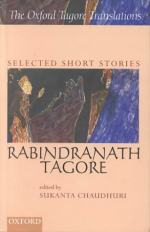|
This section contains 724 words (approx. 2 pages at 400 words per page) |

|
Selected Short Stories (Rabindranath Tagore) Summary & Study Guide Description
Selected Short Stories (Rabindranath Tagore) Summary & Study Guide includes comprehensive information and analysis to help you understand the book. This study guide contains the following sections:
This detailed literature summary also contains Quotes and a Free Quiz on Selected Short Stories (Rabindranath Tagore) by Rabindranath Tagore.
The following version of this book was used to create the guide: Tagore, Rabindranath. Selected Stories. General Press, 2017.
The following guide examines eight selected short stories by Rabindranath Tagore. Each of the selected narratives possesses its own distinct point of view, narrative structure, and linguistic style. For the sake of clarity, the following summary assumes a streamlined mode of explanation and relies upon the present tense.
In "The Cabuliwallah," the unnamed first person narrator is writing by a window when his young daughter Mini spots a Cabuliwallah, or peddler, passing in the street below. The narrator and Mini greet the man, inviting him inside. This encounter inspires a connection between the peddler and Mini over the following months. The family forgets about the Cabuliwallah, however, once he is imprisoned for attacking a man. Upon his release, he visits the narrator. The narrator learns that he is a father, too, and feels an unexpected connection with the man he once considered beneath himself.
In "The Postmaster," a postmaster from Calcutta moves to the rural village of Ulapur to take a job at the post office. The experience feels like exile, in that the postmaster dislikes the remoteness of the village and disdains its inhabitants. However, he does come to rely upon the company and attention of Ratan, the village girl he hires as his housekeeper. Although the two seem to form an authentic bond throughout the postmaster's time in Ulapur, when Ratan asks him to take her with him back to Calcutta when he leaves, the postmaster scoffs and laughs at her. He later feels guilty, but ultimately leaves Ratan behind.
In "The Child's Return," Raicharan is devastated when he accidentally loses his master Anukul's young son while out playing with the baby. Anukul's wife accuses Raicharan of stealing the child and Anukul casts Raicharan out. Not long later, Raicharan has a son of his own. The child, Phailna, uncannily resembles the little Master. Raicharan becomes convinced he is the lost baby's reincarnation. Years later, therefore, he brings Phailna to Anukul and his wife, insisting that Phailna is their boy. While Anukul's wife forgives Raicharan, Anukul does not.
In "The Home-Coming," Phatik's mother is so overwhelmed by Phatik's mischievous behavior, that she sends him to Calcutta to live with her brother and his family. Although Phatik is initially delighted by the prospect of leaving his village, almost as soon as he arrives in Calcutta, he is overcome by loneliness and longing. He later falls ill, and cries out for his mother. He is so glad to see her when she arrives, he becomes convinced it is the holidays.
In "Once There was a King," the narrator recalls an evening his grandmother told him a fairy tale. Although the fairy tale had many inconsistencies and betrayed logic, the narrator was enchanted. His youth and innocence allowed him to experience the story in a pure manner.
In "Master Mashai," although Haralal proves himself to be a faithful tutor and friend to Adhar's and Nanibala's son Venu, the couple constantly finds fault in his behavior. They doubt Haralal's intentions and are suspicious of his actions. Years later, after Haralal leaves the family's employ, he and Venu become reacquainted. However, Venu has changed. He starts to use Haralal as his relationship with his father devolves. Ultimately, he betrays his old tutor by stealing his master's money and fleeing for England.
In "Subha," because Subha cannot speak, everyone in her village believes she has neither thoughts nor feelings. Subha therefore learns to communicate with her eyes and her lips. She also develops close relationships with the river, the trees, and the animals. When her parents marry her off to a man in the city, Subha despairs. She not only has to leave her village, but is losing all of those who were familiar with her distinct mode of communication.
In "The Castaway," Sharat takes Kiran to a riverside village to recover from a mysterious illness. Because Kiran is lonely in this location, she is thrilled when a castaway named Nilkanta washes up near their home. Nilkanta monopolizes Kiran's attention. However, once her brother-in-law Satish comes to visit, Nilkanta feels pushed aside. To get back at Satish, Nilkanta steals his prized inkstand. Despite the men's insistence that Nilkanta is to blame, Kiran refuses to believe their accusations.
Read more from the Study Guide
|
This section contains 724 words (approx. 2 pages at 400 words per page) |

|



